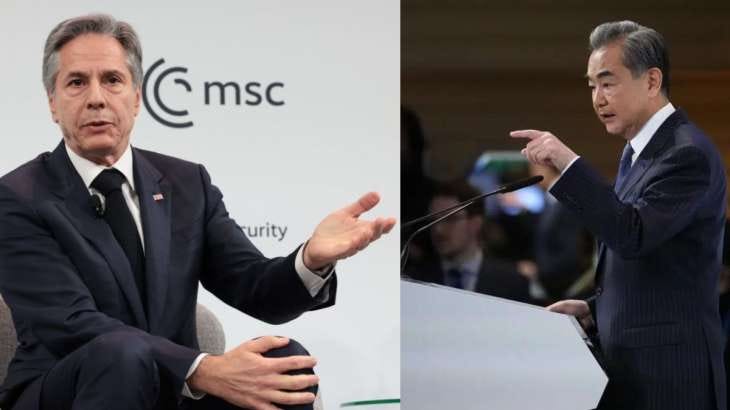What unfolded in Munich over the weekend was alarming. Chinese violation of U.S. airspace was met with an odd American response. A series of strange diplomatic gestures. After a Chinese spy balloon was first ignored, then spotted in the sky by the public and then subsequently shot down by a fighter jet to save face, Pentagon claimed it shot 3 other unidentified flying objects over North America, adding that the objects could be anything (ranging from car dealers' ad balloons to flying trash). Classic distraction pending more evidence into these sightings.
Damage control began right after Secretary of State Anthony Blinken announced he's canceling a planned trip to China to meet his counterpart State Councilor Wang Yi (a visit Chinese officials denied was scheduled in the first place).
The U.S. had hoped the Chinese balloon was never spotted by the public. President Biden himself said there have been sightings regularly since at least 2017. No need to worry. The president barely touched on the topic during his State of the Union Address. Vice President Kamala Harris said the spying incident won’t change the course of U.S.-China relations.
In short, the revelation of a spy balloon over sensitive military sites in Montana was only an inconvenience to Mr. Blinken's reset talks with China.
You might think the main topic Mr. Blinken would like to address in these talks are questions on the status of the investigations into the deadly coronavirus pandemic that killed millions around the world.
According to the World Health Organization, more than 6 million people have died from Covid-19 (6,844,267 deaths as of February 17, 2023 to be precise).
The topic that dominated 98 percent of news cycles around the world, spread fear, misinformation, censorship and various psychological troubles, was not on the agenda.
What was on the agenda then? Mainly two things: The rules of engagement between the two superpowers and Russia’s invasion of Ukraine.
As a new superpower on the world stage, China is looking for its hegemonic role overseas and constantly adjusting its soft power while it prepares its military for a future conflict. After WWII, the Soviet Union spread its communist ideology through satellite political parties and revolutions. China’s soft power has taken many forms since. From mass manufacturing house to number one trade source and a necessary partner in technology to address various global challenges like climate change, sustainable development and research.
But in recent years, China has shown its soft power could take an aggressive form, like surveillance of dissidents and Chinese nationals in regions far beyond its borders.
In December of last year, CNN reported that Beijing has set up more than 100 overseas police stations across the globe to monitor, harass and in some cases repatriate Chinese citizens living in exile, using bilateral security arrangements struck with countries in Europe and Africa to gain a widespread presence internationally.
Most of these police stations were revealed to CNN by a Madrid-based human rights campaigner Safeguard Defenders. Their reports have initiated multiple investigations worldwide in at least 13 countries.
Another way China has influenced security and policy abroad came in the aftermath of the outbreak of Covid-19. The way zero-covid policy, lockdowns and draconian public health measures were exported out of China to even the most liberal countries are an example of how fast and effective could China’s future policies could be exported abroad.
So when Mr. Blinken hoped his Chinese counterpart would make a good gesture towards a détente during the Munich Security Conference over the weekend, he was surprised to find they were not interested. On the contrary, Mr. Wang took the stage and accused the Biden administration of being “hysterical,” calling its use of fighter jets to down a balloon as an excessive use of force.
He then reminded his American counterpart that U.S. is in no position to tell China what to do.
Despite American attempts to reset relations and call for calm, Beijing’s hawkish councilor turned the tables around and said the United States was behind spy balloon programs and claimed they were flying them over China. Something Washington denies of course.
This brings us to the second issue discussed between the two high ranking diplomats: Russia’s invasion of Ukraine.
Washington’s message to Beijing? If you help Russia militarily in Ukraine, there will be “consequences.” Chinese response to this American request did not seem encouraging either. Mr. Wang hit back and pointed to the U.S. involvement in Ukraine to push for a prolonged war.
The United States might still hope to persuade China not to provide Moscow with lethal aid in its war in Ukraine and that is what the current administration is gambling on when it’s trying to downplay the Chinese global surveillance and the spy balloon program and extend a hand.
Mr. Wang’s reaction and comments point in another direction: That of a wider global rift.




